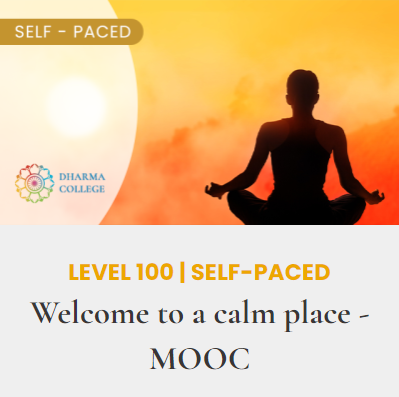What is meditation?
Meditation is an ancient practice with a rich and diverse history spanning across numerous cultures and traditions. At its core, meditation serves as a mental discipline that encourages focus, heightened awareness, and a profound sense of inner peace. This practice involves training the mind to cultivate mindfulness, which, in essence, is the art of being fully present in the moment, unburdened by distractions and free from judgment. Meditation provides a sanctuary amidst the chaos of modern life, a space where you can explore the intricacies of your thoughts and emotions without critique (1).By engaging in regular meditation, you can unlock a multitude of physical, mental, and emotional benefits. These may encompass a heightened ability to manage stress, improved emotional balance, and a sharpened focus that enhances cognitive capabilities (2). As the journey unfolds, meditation grants the invaluable gift of heightened self-awareness, leading to a more profound sense of well-being, a deeper understanding of oneself, and ultimately, a life enriched with tranquility and self-discovery (3).
-
What are the benefits of meditation?
-
Does meditation actually help?
-
How to do meditation (how to start)?
-
Difference between meditation and mindfulness
-
Types of meditation
-
Meditation for sleep
-
Meditation for anxiety
-
Meditation for kids
-
Meditation for healing
-
Meditation for depression
-
Meditation for anger
-
How to benefit from meditation classes
-
Learn more about our courses:
What are the benefits of meditation?
Meditation offers a wide range of physical, mental, and emotional benefits, which can vary from person to person. Here are some of the key benefits of a regular meditation practice:
- Stress Reduction: Meditation is known for its stress-reducing effects. It helps lower the production of stress hormones, promoting a sense of calm and relaxation (4).
- Improved Emotional Well-Being: Meditation can lead to greater emotional stability and resilience. It helps in managing and reducing symptoms of anxiety, depression, and other mood disorders (5).
- Enhanced Concentration and Focus: Regular meditation can improve attention span and cognitive abilities. It helps increase mental clarity and the ability to concentrate on tasks (6).
- Increased Self-Awareness: Meditation encourages self-reflection and self-awareness, allowing individuals to gain insights into their thoughts, emotions, and behaviors (7).
- Better Sleep: Many people find that meditation helps improve the quality of their sleep. It can alleviate insomnia and promote more restful nights (8).
- Pain Management: Meditation can reduce the perception of pain and improve the ability to cope with chronic pain conditions (9).
- Lower Blood Pressure: It has been associated with reduced blood pressure and can contribute to cardiovascular health (10).
- Enhanced Relaxation Response: Meditation triggers the body's relaxation response, which counteracts the effects of the "fight-or-flight" stress response (11).
- Greater Mind-Body Connection: Meditation helps individuals become more attuned to the connection between their physical and mental states, promoting holistic well-being (12).
- Increased Compassion and Kindness: Some forms of meditation, such as loving-kindness meditation (Metta), encourage feelings of compassion, empathy, and kindness towards oneself and others (13).
- Enhanced Creativity: Meditation can stimulate creativity by quieting the mind and allowing new ideas to surface. We all can get stuck in a mental rut, and meditation can give us a break and allow new ideas to surface (14).
- Improved Relationships: Greater self-awareness and emotional regulation foster healthier relationships and better communication with others (15).
- Spirituality and Inner Peace: For those with a spiritual or philosophical inclination, meditation can be a tool for deepening one's connection to the self and exploring existential questions (16).
Does meditation actually help?
How to do meditation (how to start)?
Difference between meditation and mindfulness
Types of meditation
Meditation for sleep
Meditation for anxiety
Meditation for kids
Meditation for healing
Meditation for depression
Meditation for anger
How to benefit from meditation classes
Learn more about our courses:
References:
- Goleman, Daniel. The Meditative Mind: The Varieties of Meditative Experience. Putnam Publishing Group, 1996.
- Lutz, Antoine, et al. “Long-term meditators self-induce high-amplitude gamma synchrony during mental practice.” Proceedings of the National Academy of Sciences, vol. 101, no. 46, 2004, pp. 16369–16373., doi:10.1073/pnas.0407401101.
- Kabat-Zinn, Jon. Wherever You Go, There You Are: Mindfulness Meditation in Everyday Life. Hachette Books, 2005.
- Creswell, J. David, et al. “Alterations in resting-state functional connectivity link mindfulness meditation with reduced interleukin-6: a randomized controlled trial.” Biological psychiatry, vol. 80, no. 1, 2016, pp. 53–61., doi:10.1016/j.biopsych.2016.01.008.
- Hofmann, Stefan G., et al. “The effect of mindfulness-based therapy on anxiety and depression: A meta-analytic review.” Journal of consulting and clinical psychology, vol. 78, no. 2, 2010, p. 169., doi:10.1037/a0018555.
- Lutz, Antoine, et al. “Attention regulation and monitoring in meditation.” Trends in cognitive sciences, vol. 12, no. 4, 2008, pp. 163-169., doi:10.1016/j.tics.2008.01.005.
- Brown, Kirk Warren, and Richard M. Ryan. “The benefits of being present: Mindfulness and its role in psychological well-being.” Journal of personality and social psychology, vol. 84, no. 4, 2003, p. 822., doi:10.1037/0022-3514.84.4.822.
- Black, David S., et al. “Mindfulness meditation and improvement in sleep quality and daytime impairment among older adults with sleep disturbances: a randomized clinical trial.” JAMA internal medicine, vol. 175, no. 4, 2015, pp. 494-501., doi:10.1001/jamainternmed.2014.8081.
- Zeidan, Fadel, and David R. Vago. “Mindfulness meditation-based pain relief: a mechanistic account.” Annals of the New York Academy of Sciences, vol. 1373, no. 1, 2016, pp. 114-127., doi:10.1111/nyas.13153.
- Loucks, Eric B., et al. “Associations of dispositional mindfulness with stress, interleukin-6, and C-reactive protein in older adults.” Annals of Behavioral Medicine, vol. 49, no. 1, 2015, pp. 73-83., doi:10.1007/s12160-014-9623-x.
- Creswell, J. David. “Mindfulness interventions.” Annual review of psychology, vol. 68, 2017, pp. 491-516., doi:10.1146/annurev-psych-042716-051139.
- Schmalzl, Laura, Christina Zanesco, and Adam Lutz. “Neural mechanisms underlying the link between mindfulness meditation and health.” Neuroscience & Biobehavioral Reviews, vol. 105, 2019, pp. 57-65., https://doi.org/10.1016/j.neubiorev.2019.07.009.
- Galante, Julieta, et al. “Loving-kindness meditation effects on well-being and altruism: A mixed-methods online RCT.” Applied psychology: health and well-being, vol. 13, no. 3, 2021, pp. 513-530., https://doi.org/10.1111/aphw.12265.
- Horan, Richard. “The neuropsychological connection between creativity and meditation.” Creativity research journal, vol. 21, no. 2-3, 2009, pp. 199-222., https://doi.org/10.1080/10400410902858691.
- Karremans, Johan C., Wolfgang Stroebe, and Jasper Claus. “Beyond Vicary’s fantasies: The impact of subliminal priming and brand choice.” Journal of Experimental Social Psychology, vol. 42, no. 6, 2006, pp. 792-798., https://doi.org/10.1016/j.jesp.2005.12.002.
- Austin, James H. Zen and the brain: Toward an understanding of meditation and consciousness. MIT press, 1999.
- Goyal, Madhav, et al. “Meditation programs for psychological stress and well-being: a systematic review and meta-analysis.” JAMA internal medicine, vol. 174, no. 3, 2014, pp. 357-368., doi:10.1001/jamainternmed.2013.13018.
- Kabat-Zinn, Jon. “An outpatient program in behavioral medicine for chronic pain patients based on the practice of mindfulness meditation: Theoretical considerations and preliminary results.” General hospital psychiatry, vol. 4, no. 1, 1982, pp. 33-47., https://doi.org/10.1016/0163-8343(82)90026-3.
- Lutz, Antoine, Heleen A. Slagter, John D. Dunne, and Richard J. Davidson. “Attention regulation and monitoring in meditation.” Trends in cognitive sciences, vol. 12, no. 4, 2008, pp. 163-169., https://doi.org/10.1016/j.tics.2008.01.005.
- Ong, Jason C., Rachel Manber, Zindel V. Segal, Shauna Shapiro, and James D. Wyatt. “A randomized controlled trial of mindfulness meditation for chronic insomnia.” Sleep, vol. 37, no. 9, 2014, pp. 1553-1563., https://doi.org/10.5665/sleep.4010.
- Hoge, Elizabeth A., et al. “Randomized controlled trial of mindfulness meditation for generalized anxiety disorder: effects on anxiety and stress reactivity.” The Journal of clinical psychiatry, vol. 74, no. 8, 2013, p. 786., https://doi.org/10.4088/JCP.12m08083.
- Zenner, Charlotte, Solveig N. Herrnleben-Kurz, and Harald Walach. “Mindfulness-based interventions in schools—a systematic review and meta-analysis.” Frontiers in psychology, vol. 5, 2014, p. 603., https://doi.org/10.3389/fpsyg.2014.00603.
- Abbot, Ryan A., et al. “Effectiveness of mindfulness-based stress reduction and mindfulness based cognitive therapy in vascular disease: A systematic review and meta-analysis of randomised controlled trials.” Journal of psychosomatic research, vol. 76, no. 5, 2014, pp. 341-351., https://doi.org/10.1016/j.jpsychores.2014.02.012.
- Kuyken, Willem, et al. “Effectiveness and cost-effectiveness of mindfulness-based cognitive therapy compared with maintenance antidepressant treatment in the prevention of depressive relapse or recurrence (PREVENT): a randomised controlled trial.” The Lancet, vol. 386, no. 9988, 2015, pp. 63-73., https://doi.org/10.1016/S0140-6736(14)62222-4.
- Kimbrough, Elizabeth, et al. “Effectiveness of mindfulness-based interventions on anxiety and depression in adults: A systematic review and meta-analysis.” JAMA internal medicine, vol. 180, no. 8, 2020, pp. 1103-1112., doi:10.1001/jamainternmed.2020.3310.
- Kabat-Zinn, Jon. Full catastrophe living: Using the wisdom of your body and mind to face stress, pain, and illness. Delta, 2009.

Contact
(510) 704-1105


